The Intel Core i7-7700K (91W) Review: The New Out-of-the-box Performance Champion
by Ian Cutress on January 3, 2017 12:02 PM ESTLegacy Tests
At AnandTech, I’ve taken somewhat of a dim view to pure synthetic tests, as they fail to be relatable. Nonetheless, our benchmark database spans to a time when that is all we had! We take a few of these tests for a pin with the latest hardware.
Cinebench R10
The R10 version of Cinebench is one of our oldest benchmarks, with data going back more than a few generations. The benchmark is similar to that of the newest R15 version, albeit with a simpler render target and a different strategy for multithreading.
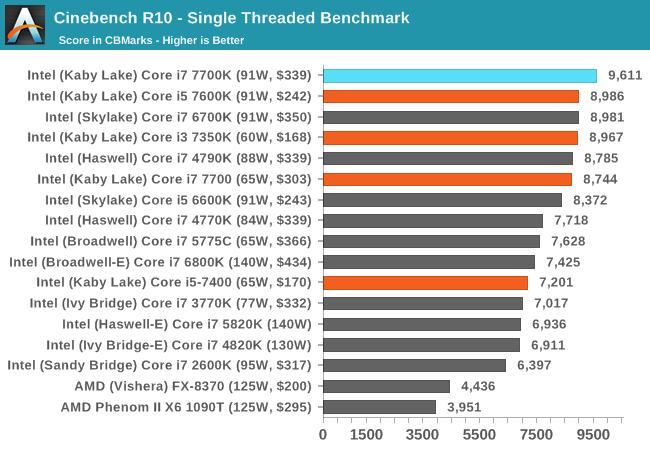
For a few years I was under the impression that CineBench’s workload was not amenable to more IPC increases, as we hovered around 7000 pts with new microarchitectures not making much of a difference. Being high frequency the i7-7700K pulls out a lead here, but it’s worth noting that Kaby Lake as a whole scores well, perhaps indicating that other features (such as frequency speed changing) can help.
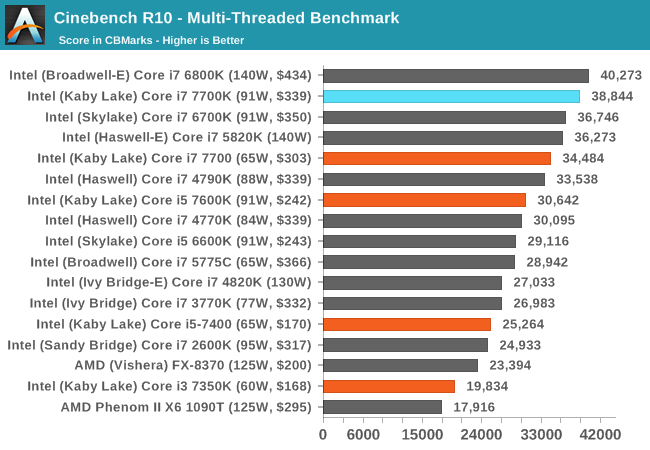
The multithreaded test gives different results, as this test typically prefers many cores. Rather than the new Cinebench tests dividing the scene up into over a hundred pieces (depends on threads), CB10 purely divides the scene into exactly how many threads are present. If a thread finishes early, it will try and cut the work of another thread in half. This sort of approach to multithreading has a different approach to frequency, cores and IPC, hence why R11.5 and R15 do bigger separations with core workloads.
Cinebench R11.5
CB11.5 has been popular for many years as a performance test, using easy to read and compare numbers that aren’t in the 1000s. We run the benchmark in an automated fashion three times in single-thread and multi-thread mode and take the average of the results.
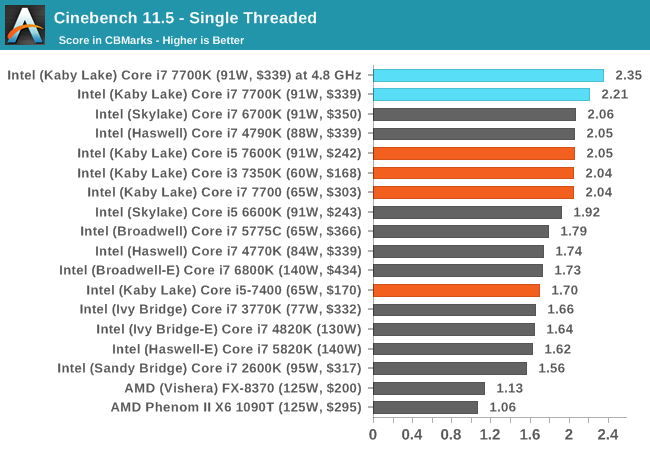
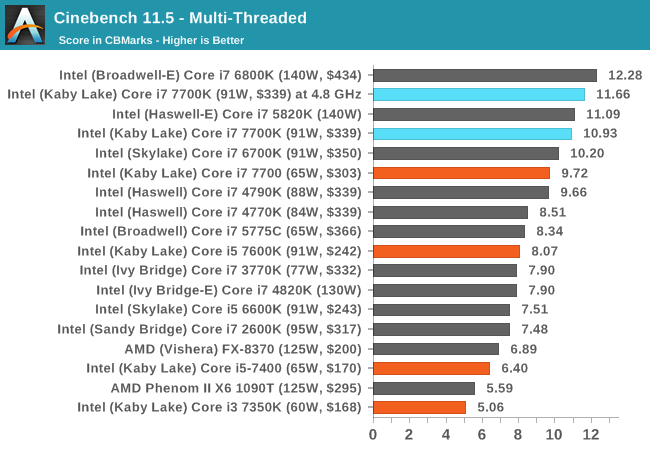
Similar to other tests, the i7-7700K takes the single thread crown, again beating an overclocked Devil’s Canyon i7-4790K, showing the out-of-the-box performance. Again, Kaby Lake as a whole seems to do well here, thanks to 4.2 GHz turbo modes on the i5-7600K and i3-7350K.
7-zip
As an open source compression/decompression tool, 7-zip is easy to test and features a built-in benchmark to measure performance. As a utility, similar to WinRAR, high thread counts, frequency and UPC typically win the day here.
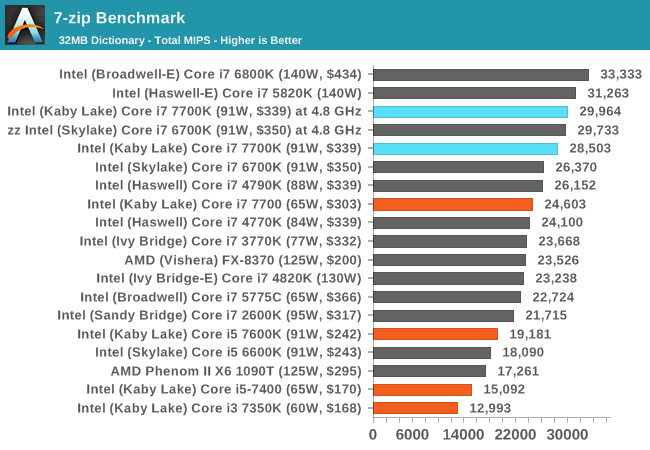
The Core i7-7700K shows the benefits of frequency over a stock i7-6700K, however at the same frequency they perform roughly the same as expected.
POV-Ray
Ray-tracing is a typical multithreaded test, with each ray being a potential thread in its own right ensuring that a workload can scale in complexity easily. This lends itself to cores, frequency and IPC: the more, the better.
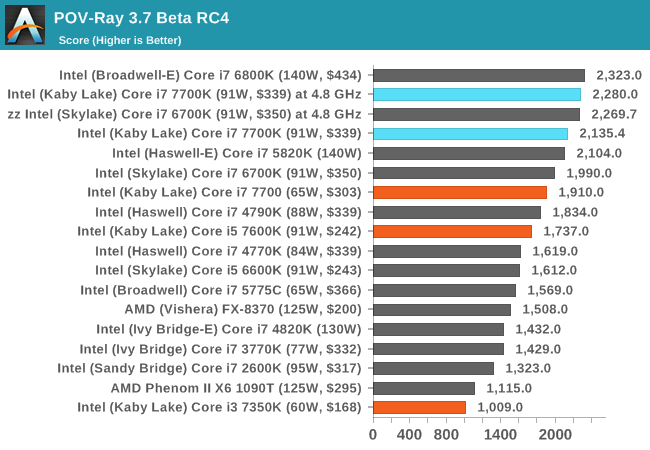
AES via TrueCrypt
Despite TrueCrypt no longer being maintained, the final version incorporates a good test to measure different encryption methodologies as well as encryption combinations. When TrueCrypt was in full swing, the introduction of AES accelerated hardware dialed the performance up a notch, however most of the processors (save the Pentiums/Celerons) now support this and get good speed. The built-in TrueCrypt test does a mass encryption on in-memory data, giving results in GB/s.
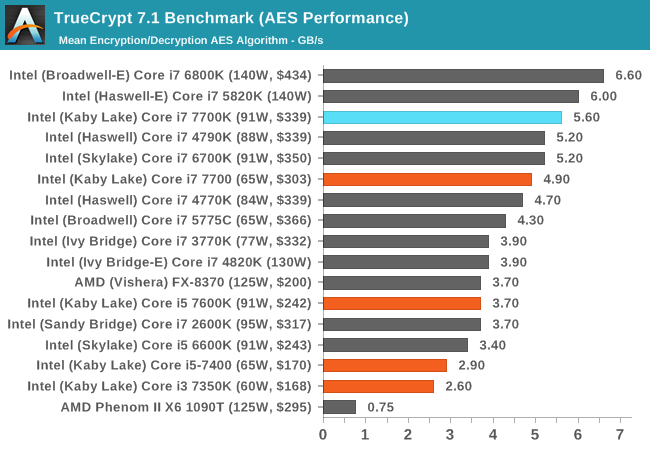
The encryption benchmark loves both threads and memory bandwidth, so we see the extreme processors pull out large leads due to 6+ cores and four memory channels. However, we see a similar picture as before to the Devil’s Canyon part: an out-of-the-box Core i7-7700K will beat an overclocked Core i7-4790K at 4.7 GHz.










125 Comments
View All Comments
Jason335 - Saturday, January 7, 2017 - link
I'm really looking forward to this: "Calculating Generational IPC Changes from Sandy Bridge to Kaby Lake". I'm still running an i5-2500k clocked to 4.3ghz. I'd like to know what performance I'm leaving on the table, in addition to new tech like USB3.1, PCIe3.0, NVME, etc etc etc.cheshirster - Sunday, January 8, 2017 - link
Windows 7 and old games.These tests start to look outdated.
HerrKaLeun - Sunday, January 8, 2017 - link
to all the people whining about the relatively small increase in performance: this is expected with an interim upgrade. Intel never promised more. Intel (or AMD) doesn't owe you anything. If you think you can make better CPUs and upgrade faster, just make them. no one stops you from creating a startup and make your own CPUs :-)no one in his or her right mind would buy the same CPU (i.e. going from 6700 to 7700) and expect a huge increase. This has been a known fact for years that upgrading is worthwhile after a few years.
I just installed an i7 7700K in my rig (it replaces an i36600) and the bump is huge. At given handbrake settings I now can encode 3 instances of videos and each video takes 2-3 hours while with the i3 a single instance took 12-16 hours (i use slowest speeds to get the smallest and best video file and quality). To me the upgrade was worth the money (obviously going from i3 to i7 is noticeable when using multi-threaded apps).
I was contemplating of getting the i5K for $100 less, but decided more threads, more cache and more clock is great.
BTW, even when using all cores clock is at 4.33 GHz consistently, not the 4.2 GHz i though if it uses all cores. It jumps to 4.37 every once a while while working on the 3 Handbrake instances. Most reviews measure single apps, but in real life you use the PC while it works. Just using browser, watching web videos etc. adds more load that is not reflected in benchmarks. the added power really is good. With the i3 chrome or my game sometimes took 20-30% of my CPU, which slowed Handbrake noticeably down. Now those apps use not more than 5% if at all. So in real life the HT seems to help more.
this review was great, like most of Anand's. Ian does a really great job. To all the people complaining about the article:
- it was free to read
- no one forced you to read it
- you could apply to become a writer and write better articles. but soemhow it seems easier to just complain....
HerrKaLeun - Sunday, January 8, 2017 - link
this needs an edit function: I do not OC (only have an H170 board). above clock speed is out of the box.coachingjoy - Monday, January 9, 2017 - link
Thanks for the work.Helps with buying decisions.
ewags - Friday, January 13, 2017 - link
Great review, I will need to see if I can get my CPU over 5.2ghz Stable with a few tweaks that you did.Infkos - Saturday, January 14, 2017 - link
no one talks about temps problems with 7700K, only works on water coolingfanofanand - Thursday, January 26, 2017 - link
'only works on water cooling"GTFO troll.
theVatansever - Tuesday, January 17, 2017 - link
I think i'm the lucky one,,,without AVX offset, i'm perfectly stable at 4 cores @5000mhz @1,34V ....1.5hrs of prime95 torture test without any issue, max temp seen is 81C with liquid cooler.(average temps are around 72C)hapkiman - Saturday, January 21, 2017 - link
After an opportunity dropped in my lap to get this processor for next to nothing, I got it and installed it on an MSI Z170A mobo (after a BIOS update). I'm very impressed. This is a nice processor, and an outstanding overclocker. Without even touching the voltage, I went to 4.8GHz without a sweat. With tasking and voltage adjustment, I see 5GHz is attainable. Maybe this is the new Sandy Bridge? My 6700k could not even maintain a stable 4.7GHz.